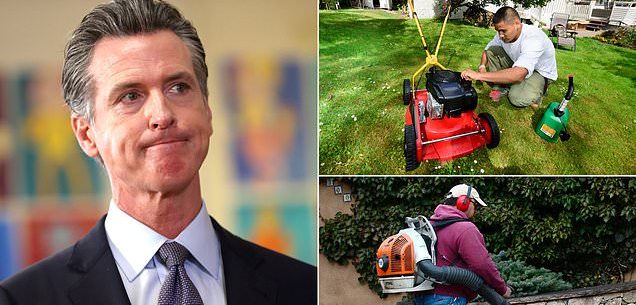California recently announced that they will soon ban the sale of gas-powered vehicles and small engines, including leaf blowers and lawnmowers, as an attempt to curb the emissions that produce pollution each year. Gov. Gavin Newsom signed the order into law ruling the ban on gas-powered equipment.
The list also includes banning the sale of gas-powered generators, lawn equipment, chainsaws, weed trimmers, golf carts, and pressure washers, which will be in effect by Jan 1, 2024, or as soon as regulators determine is “feasible.” The law states that these machines must either be zero-emissions or be battery-powered or plug-in.
Marc Berman, the bill’s author, shared that it is a “modest approach” to limiting the amounts of pollution, as well as the health impact on the workers using it constantly. He called it “amazing” to see how people react when they see how much of the equipment pollutes and causes smog-forming emissions.
But others pointed at the fact that the bill will nearly offset 50,000 small businesses, as California’s budget is still not capable of supporting all of the professional landscapers and gardeners still using the gas-powered equipment. The National Association of Landscape Professionals even notes that the equipment is both more expensive and less efficient. A gas-powered riding lawn mower costs between $7,000-$11,000 while zero-emissions versions of the equipment can cost up to twice the amount.
California has given itself the challenge of trying to end gas-powered sales and “build enough infrastructure” to make it convenient for everyone to buy an electric car. But many people are noting that these mandates instilled by Newsom are going to impact low-income communities the most. It is also very similar to Newsom’s order last September 2020 that mandating all California car sales be zero-emissions models by 2035. This would also require that new bus and truck sales would also be zero-emissions vehicles by 2045.
Newsom said they would work on accomplishing that goal by putting electric car chargers in every available place and working on “a massive overhaul” of the state’s infrastructure and policy. But many people have pushed back against installing chargers into parking lots and buildings, adding that it can trigger building code requirements and further increase the costs. This happens frequently for those who live in older buildings where the electrical upgrades are more costly while residents tend to have lower incomes.
To meet Newsom’s targets, electricity would also have to increase by 9.5%, which GOP politicians argue that the state would not be able to handle. They have become increasingly reliant on wind and solar power, which has led to rolling blackouts during the summer heatwaves.
“California’s record of rolling blackouts — unprecedented in size and scope — coupled with recent requests to neighboring states for power begs the question of how you expect to run an electric car fleet that will come with significant increases in electricity demand, when you can’t even keep the lights on today,” Environmental Protection Agency Administrator Andrew Wheeler wrote to Newsom in a recent letter.
Newsom has no plan other than to cut out the small businesses and equipment he believes are “threatening” the environment. Only a Democrat would believe putting an electric car charger on every block and shutting down small businesses solves climate change.


